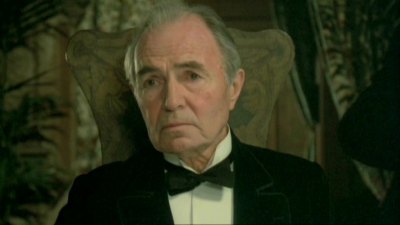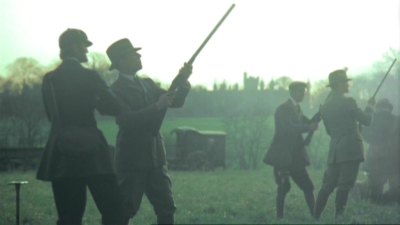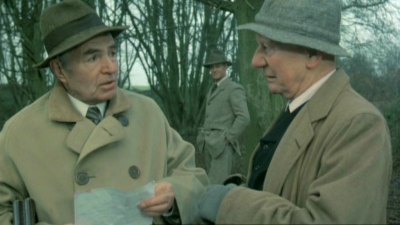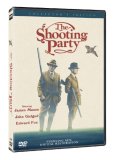| Reviews & Columns |
|
Reviews DVD TV on DVD Blu-ray 4K UHD International DVDs In Theaters Reviews by Studio Video Games Features Collector Series DVDs Easter Egg Database Interviews DVD Talk Radio Feature Articles Columns Anime Talk DVD Savant Horror DVDs The M.O.D. Squad Art House HD Talk Silent DVD
|
DVD Talk Forum |
|
|
| Resources |
|
DVD Price Search Customer Service #'s RCE Info Links |
|
Columns
|
|
|
Shooting Party, The
Beautifully rendered, but dramatically limited, The Shooting Party is the kind of film that seems to impress some viewers because they take it for nostalgic allegory. They see it as an "important" metaphor, disguised as a look back at a romantic period in history right on the cusp of irreversible change, with a cast of characters who realize that an upheaval of their comfortable lives is imminent, but who are powerless to stop it. All of this isn't exactly hard to ascertain in The Shooting Party, particularly when the lead character literally spells out the film's parable right off the bat. I remember seeing The Shooting Party when it first came out in 1985, and hearing a friend of mine rhapsodize - as if she had discovered something hidden and secret from most viewers - about the film's themes of the vanishing usefulness of the English aristocracy before the advent of World War I, with a weekend shooting party on a country estate as a metaphor for this coming cultural transformation. But nothing could be easier than discerning what The Shooting Party means in its more obvious way. If you get lost amid the scenery and meticulously recreated, plush surroundings, don't worry; a character is bound to tell you directly what it's all about.

Rather than working as portentous herald, The Shooting Party is far more successful at presenting a melancholy treatise on the romantic illusions between bored, wealthy aristocrats, as well as showcasing a handful of terrific performances by some of the best English actors working in films at the time. There are no characters or emotional situations in The Shooting Party that we haven't seen in several other prior films, but what is dramatized in The Shooting Party is so carefully and thoughtfully presented, that it becomes a surprisingly effective experience despite a sneaking sense of deja vu and the baldface manipulations of the allegorical references. Chief among the delights of The Shooting Party is a magnificent, mournful final performance by that most underrated actor, James Mason. Playing Sir Randolph Nettleby, Mason has no need of a script's pretentious metaphor or fable to convey the ironic passing of a cultivated, sheltered, privileged life he both loves and despises; Mason's very presence, his actor's aura, with his supremely patient, cultured, yet ever-so-subdued scorn, is the very epitome of the emotions he's enacting in The Shooting Party. It may be his greatest performance in a career filled with great performances.
The Shooting Party takes place on a vast English country estate in Autumn of 1913. Sir Randolph Nettleby (James Mason) and his wife Lady Minnie (Dorothy Tutin) are hosting a weekend shooting party for their guests. They include foolish, insular Lord Bob Lilburn (Robert Hardy) and his young, sensitive and beautiful wife Lady Olivia (Judi Bowker); Lord Gilbert Hartlip (Edward Fox), a cold, hard, professional shooter, and his wife Lady Aline (Cheryl Campbell); Lionel Stephens (Rupert Frazer), a compassionate, educated gentleman; Ida Nettleby (Sarah Badel), the daughter-in-law of Sir Randolph and Lady Minnie, and her daughters Cicily (Rebecca Saire) and Violet (Mia Fothergill), and sons Marcus (Warren Saire) and Osbert (Nicholas Pietrek); Sir Reuben Hergesheimer, a rich business associate of Sir Randolph; and Count Tibor Rakassyi, a moneyed Hungarian prince.
SPOILERS
On the surface, each of the guests, as well as the hosts, present a placid facade of exacting adherence to the rules of polite society, a carefully constructed air of indifference to anything outside their privileged lives, and a devotion to the social and political conventions of their beloved England. But of course, as the weekend progresses, each character will show a different, unexpected side of their desires and thoughts, before carefully replacing their veneer of impenetrable respectability. Lionel and Lady Olivia will declare an impossible love for each other, which is heightened by Olivia's growing realization that she is in a loveless marriage with her pompous, foolish husband; the paranoid, closed-off Lord Gilbert (brilliantly played for audience contempt by Edward Fox) will reach out to his adulterous, heavily-in-debt wife, Lady Aline, who is having an open affair with Sir Reuben, only to be rightly rebuffed for previous affairs of his own; young Cicely will explore her feelings for the imperious, uncaring Prince Tibor; Lady Minnie will realize that her relationship with Lady Aline is based more on money than on respect and love; and Sir Randolph, most sadly, will realize that the aristocratic life he loves and respects - the quiet country life of his solitary literary pursuits, as well as his role as paternal overseer of his community - is rapidly degenerating into the decadence of his house guests who, like his wife, crave gossip and society and illicit pursuits of gambling and love affairs, over their prescribed social responsibilities to God and the "village green of England."

SPOILERS
The weekend shoot, where the aristocrats engage in the wholesale slaughter of pheasants beaten out of their brush hiding places, is of course used not only as an obvious metaphor of the coming world war, but also as a convenient vehicle for the various characters to act out their own individual personality quirks. Lionel, who shoots better than Lord Gilbert, understands Olivia's distaste for the so-called noble hypocrisies of the blood bath, but that doesn't stop him for bringing down bird and bird. Lord Gilbert, intensely aware that Lionel is bagging more game than he (a form of keeping score that Sir Randolph would see as the ultimate vulgarity), pushes himself to the breaking point, until a tragedy occurs on the last day of the shoot. And the other various players show their true colors once that tragedy is made apparent, with many of them unfazed or at least only momentarily concerned, by the death of Tom Harker (Gordon Jackson), the known poacher of Sir Randolph's game who ironically remains, right up until his death, a loyal devotee of Sir Randolph and the British Empire.
While the overall aim of The Shooting Party goes awry in obvious overstatement, what it does very well, under the direction of Alan Bridges, is to give the viewer isolated, perfectly polished gems of scenes that illuminate a particular facet of a character's personality. There's an amazing, justly famous scene between Mason's Sir Randolph and vegetarian animal rights pamphleteer Cornelius Cardew (John Gielgud). During the height of the shoot, Cardew foolishly walks down the line of shooters, carrying a placard denouncing their slaughter, before he is brought over to Sir Randolph. The viewer expects Sir Randolph to angrily dismiss him, but instead, the tolerant, inquisitive Sir Randolph engages Cardew in a discussion on the quality of Cardew's pamphlet printing. Cardew eagerly warms to Sir Randolph's obvious interest in his efforts (although Sir Randolph would never agree with the thoughts contained in the pamphlet), and a benign mutual sense of fraternity passes between the two men, two men of words and ideas. It's a magical moment in The Shooting Party, and it far surpasses any of the film's more obvious strainings at being "meaningful" about something larger than itself. It's these kinds of revelatory moments in The Shooting Party, usually facilitated by the superlative cast and not necessarily the script, that makes The Shooting Party worthwhile viewing.

The DVD:
The Video:
The DVD cover of The Shooting Party claims a "stunning new digital restoration," and the film does look good here, but I'd hardly call it stunning. While this particular widescreen, enhanced for 16x9 1.78:1 transfer is certainly better than the last pan-and-scan video release of this title, the original elements of the film still present problems of grain, a certain greenish cast to most scenes, faded colors in others, and a soft (perhaps intentional) throughout the film. I also noticed some compression and edge enhancement problems during the more busy scenes. The Shooting Party looks good here, considering the original elements and their age, but it is not "stunning."
The Audio:
The English mono soundtrack is adequate for the job, but I would have liked to have heard that lovely score by John Scott in stereo.
The Extras:
There are quite a few nice extras on The Shooting Party DVD, including a 44 minute new featurette, The Shooting Party -- A Retrospective which gives a wealth of background on the making of the film, including recent interviews with many of the cast and crew. Knebworth - Playing Nettleby is a fascinating tour of the Knebworth House, which was the primary location for the film. There's a short vintage BBC report from 1984 on the production of the film, a gallery with photos from the film, and the original theatrical trailer.
Final Thoughts:
Forget the obvious straining to make The Shooting Party larger and more important than it really is; it's a marvelously evocative dissertation on the romantic follies and emotional pretensions of the English idle rich during that last peaceful autumn before the start of World War I, and that's more than enough to recommend it. Add to that James Mason's finest, final performance, as well as a host of other brilliant appearances by Gordon Jackson, Edward Fox, Dorothy Tutin, Cheryl Campbell, and John Gielgud, and The Shooting Party becomes must viewing for devotees of English period drama. I highly recommend The Shooting Party.
Paul Mavis is an internationally published film and television historian, a member of the Online Film Critics Society, and the author of The Espionage Filmography.


|
| Popular Reviews |
| Sponsored Links |
|
|
| Sponsored Links |
|
|
| Release List | Reviews | Shop | Newsletter | Forum | DVD Giveaways | Blu-Ray | Advertise |
|
Copyright 2024 DVDTalk.com All Rights Reserved. Legal Info, Privacy Policy, Terms of Use,
Manage Preferences,
Your Privacy Choices | |||||||













